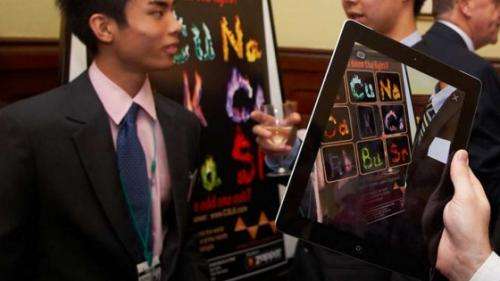Chemistry in schools comes alive through smartphones

In the modern classroom, mobile phones can be the bane of teachers’ lives. An interactive poster produced by Cambridge to promote chemistry in schools is attempting to reverse this, by harnessing smartphone technology developed at the University. The Zappar phone app breathes animated life into chemical symbols featured on the poster, in a bid to encourage more students to investigate the subject.
Distributed in January by the magazine Education in Chemistry, the poster displays a sequence of blazing elements. When the free app Zappar is downloaded and pointed at the poster, the symbols flicker into fiery action. Using the camera feature on the phone, the app creates a ‘mash-up’ of the real and virtual, adding an interactive digital layer to the poster using what’s known as ‘augmented reality’.
Tap a flaming symbol, and the voice of Dr. Peter Wothers from the Department of Chemistry gives more information about the element. The poster asks students to identify the odd one out, directing them to the website for the Cambridge Chemistry Challenge, where they are encouraged to take part in a monthly online competition featuring five ‘Google-proof’ chemistry questions. Each question has to be solved to move on to the next, with increasing levels of difficulty, and solving all five merits a place on the Honours Board for that month.
“I put the poster up in the department last Friday morning, and stood by it with my smartphone as students came in for the first lesson of the day. Once the first one had spotted what was going on, I had a steady stream of students downloading the app and using it, sometimes so many that they blocked the corridor!” said Ian Sheldon, Head of Chemistry at Bedford School.
The Cambridge Chemistry Challenge was set up by Dr. Wothers to give students and teachers a new and fun way of approaching the subject. Last year, the competition was taken by more than 3,000 students from 250 schools across the country, with the top performing students receiving awards from Cambridge MP and research scientist Dr. Julian Huppert, at a ceremony in the Houses of Parliament. It is expected that this year many more students will take part.
“My mission over the past 10 years has been to raise the profile and enjoyment of chemistry amongst students,” says Dr. Wothers. “We wanted the Cambridge Chemistry Challenge to get students approaching science problem solving in a way that helps prepare them for undergraduate study. They have to be creative, apply knowledge of other subjects and think in different ways – exactly the kind of skills needed for university.”
“The hope is that initiatives such as this will provide a great opportunity to identify our brilliant scientists of the future.”
The Zappar mobile app, and the augmented reality technology behind it, was developed by former Department of Engineering students Simon Taylor and Connell Gauld during their time at Cambridge, in conjunction with their supervisor Dr Tom Drummond. This is the team’s second collaboration with Dr Wothers, following the chemistry-themed front cover of last year’s Science Festival programme.
Zappar’s creators believe that one of its strengths lies in its ‘markerless’ ability. Some augmented reality technologies require large printed markers to link the digital to the physical, whereas Zappar can add content to any image, provided it has enough texture.
“We expect advertisers in particular will start to make use of the technology, but there are also plenty of great educational uses where books and posters can be made more interactive,” says Simon Taylor, one Zappar’s inventors. “It is great to be working with Peter and the chemistry department again; helping promote science in schools is an immensely worthwhile application for Zappar’s technology as far as we’re concerned.”
Provided by University of Cambridge

















